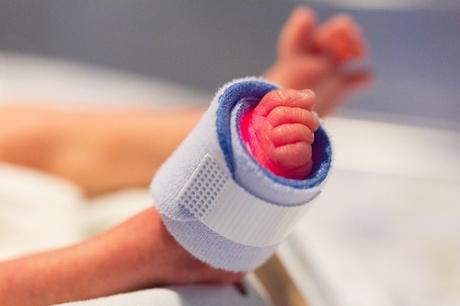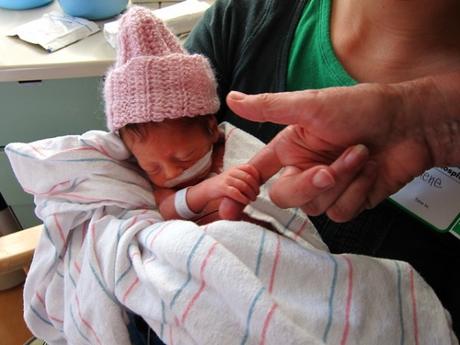June 19, 2019 Leave a Comment
Taking your premature baby home from the hospital can be exciting but scary. Here’s everything you need to know to make this transition a stress free one.
Being a new Mom to a preemie is a whole different bag of emotions from being a full term baby’s mother. A preemie Mom wants to enjoy this beautiful stage of finally coming face to face with the baby, but she has to wait for days or even weeks before it happens. Being separated from your baby in those early days while the little one is strapped up to so many machines in the NICU – it can be traumatizing, to say the least.
So when you hear that you can now take the baby home with you, you heave a sigh of relief. In most cases, your baby will be allowed to come home if he can maintain his body temperature, feed without a tube and can put on weight. When the baby clears these tests, you’re glad that you can now return to a ‘normal’ family life.
However, when it’s actually time to go home, new Moms are filled with doubt and apprehension. In hospital, you were surrounded by medical staff who could handle anything, but at home you’re going to do all this by yourself. But new parents often underestimate themselves – all they need is some encouragement and the right support. Today we’re going to talk about everything you need to know when you’re bringing your premature baby home from the hospital. These tips will help you be prepared for common challenges faced by preemies and guide you on ways to tackle them.

Common Challenges presented by Preemies
1. Sleep apnea – Apnea refers to an absence of breathing for more than 20 seconds. It is common among premature babies, with about half of all premature babies suffering from sleep apnea. Apnea can also cause a slow heart rate or a change in color.
2. Breathing trouble – Several preemies have some kind of breathing problem, which requires extra oxygen or a ventilator. In some cases, this may develop into a more serious condition called bronchopulmonary dysplasia (BPD), which requires oxygen and medication for a longer period.
3. Infections – In general, newborns are prone to infections due to their weak immune systems, but premature babies are particularly at risk, especially for viral infections. A common viral infection that affects preemies is the respiratory syncytial virus (RSV), that appears similar to a cold and can be dangerous for premature infants. Another common infection is thrush, a fungal infection that is passed between mother and baby.
4. Feeding – Feeding premature babies is a round-the-clock process since their tiny tummies can hold a very small amount at a time. As a result, they need to be fed frequently. However, they haven’t developed enough to ask for food, so Moms may have to set alarms and wake the baby to feed. At the same time, a preemie’s intestines are not ready to digest milk, and they may spit up a lot initially.
Taking your Premature Baby Home – A Complete Guide
At the Hospital

1. You will be informed about whether your baby will need extra oxygen or anything else. In such cases, learn how to use the equipment you’ll need so you don’t have to struggle with the instruction manual once you get home.
2. Take the time to list out every single doubt you have and clear them with your doctor. Feel free to take notes so you can refer to them later.
3. Try a nesting or rooming-in period with your little one. This is where the new parents and preemie are given a day or two in a separate room, prior to discharge, so they can get the hang of handling the baby by themselves.
4. Meet with a lactation counselor. Feeding preemies can present challenges different to feeding full term babies, so don’t rely on hearsay or unqualified advice. Get proper information from a lactation counselor so you and your baby can get the knack of a proper latch. The counselor can also teach you about pumping and maintaining your supply as well as overcoming common breastfeeding problems.
5. Get the help of experienced nurses from the hospital to learn all the basics – feeding, diapering, washing, swaddling as well as massaging. The process for all these tasks can require extra care for a preemie, so it helps to get professional advice.
6. Parents of preemies are advised to learn CPR before leaving the hospital. With preemies being more susceptible to breathing problems, they are also more likely to choke, and first aid like CPR can come to the rescue in such situations.
7. If you have a baby boy and are considering circumcision, this is the time to talk to your doctor about it. If your preemie is healthy and feeding well, your doctor may let you do it now, or he may suggest a later date.
Before Leaving the Hospital

1. Gather all your bills and submit requests for any documents you may need for your medical insurance coverage. Sort out other formalities like application for birth certificate or other details.
2. Once you’ve settled upon a pediatrician for your child, get a plan for follow ups so you can plan your hospital trips well in advance. This is also the time to get the full immunization timetable custom made for your preemie.
3. Get the house ready. Since you had a preemie, it’s likely you went into labor unexpectedly and left the house in a hurry. Arrange for someone to clean the house from top to bottom, taking special care of your baby’s room.
4. You are going to have to spend the first several weeks at home exclusively caring for your baby, so make sure you get enough support. Let the new Dad apply for paternity leave, if possible. Hire a full time maid, or get an additional one to handle tasks you usually do, like cooking. Outsource household tasks like laundry and ironing. Make use of online services to deliver groceries and baby essentials.
5. Stock up on all the essentials. Preemies are very small, and they may need specialized diapers and clothes. But don’t buy too many since your baby will outgrow them fast. Also get a good quality breast pump, bottles and sterilizer. You will also need a nasal aspirator, medication syringe and lots of hand sanitizer. Besides these, get hold of a baby wearing sling, feeding bras and shirts/gowns that open in front, since your baby will need lots of skin-to-skin contact.
6. Install a proper car seat. A newborn car seat may be too big for a premature infant, and it may need extra padding or supports to ensure the baby’s head stays stable and that the airway is open. Preemies don’t have enough muscle control to move their heads if they have difficulty breathing, which is why this is important. If your baby is using an oxygen cylinder, you’ll have to make place for this in your car as well.
7. It is advised that close family members of the preemie get immunized with the pertussis vaccine. This will ensure that the baby has a shield of protection around him when he’s at home.
Once you’re Home

1. Cut down on visits. This can be quite difficult considering this is the time when relatives pour in to bless the new child, but this can prove dangerous for a premature infant with weak immunity. Politely let everyone know that you have strict orders from the doctor to not have guests, and they can come visit when the baby is stronger.
2. Maintaining proper hygiene is very important when caring for a premature baby. Let anyone who holds the baby wash their hands thoroughly first. Place a hand sanitizer everywhere for easy access. Advice older siblings too, who may come rushing from school straight to see the baby. Avoid going out in public with the baby except to the doctor’s office. If you have pets at home, keep them away for the initial weeks or months.
3. Ensure that the preemie’s sleeping arrangements are safe. The American Academy of Pediatrics recommends that the baby sleep in the same room as the parents, though not necessarily the same bed. Premature babies are at higher risk of Sudden Infant Death Syndrome, or SIDS. Due to this, it’s advised to keep the crib clear of blankets, bumpers, pillows and soft toys. Maintain the room temperature between 20 and 22 degrees Celsius, since overheating can also cause SIDS.
4. Increase skin-to-skin contact, also known as kangaroo care. Let the baby wear only a diaper and lie on your chest, with her face turned to one side so she can breathe easily. Baby wearing in a sling can also help, as long as you use one that provides proper neck and head support for the preemie. Kangaroo care is greatly beneficial for preemies, encouraging breastfeeding and improving overall health.
5. Plan hospital visits carefully. Choose the first slot of the day so that your baby is not waiting in a room with other children who may have all kinds of infections. In case you do have to wait, ask for seating in a separate area from other patients.
6. Accept help from anyone who offers it, even if it means that many things don’t get done to your satisfaction. During this time, being with your baby is of prime importance, so it’s okay if everything else isn’t perfect. Let neighbors or relatives help with babysitting older kids, running errands outside or bringing you meals.
Spending all that time in the hospital when your baby is in the NICU can take a toll, both emotionally and physically. That’s why it’s important to rest, eat well and just be happy. If you experience any signs of postpartum depression, ask for help right away. With due time, you, your baby and the whole family will gradually fall into a routine, and as your baby gets stronger, you can all enjoy this wonderful phase together.

Organic · FSSAI Certified · NABL Lab certified Buy Sprouted Sathumaavu Health Mix powder for Babies / Homemade Cerelac Dry Fruits Powder for Babies/Toddlers Pancake Mixes for Toddlers TweetPinShare+1WhatsAppEmail
Filed Under: Baby, Baby health, Health, Parenting Tagged With: babies, baby care, baby health, caring for a preemie, caring for a premature baby, how to care for a preemie, how to care for a premature baby, Moms, new moms, parenting, parenting tips, premature baby
